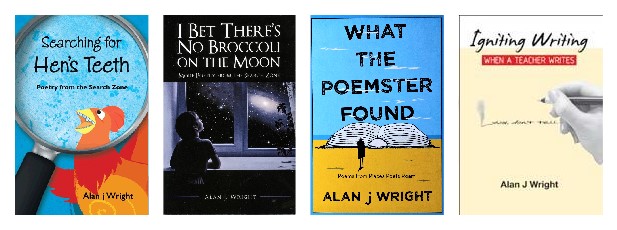There is so much more to poetry than haiku and acrostics. Yet, so many young poets never get to experience the rich breadth of poetry beyond these highly structured forms. Why?
Primarily, it’s about their teachers comfort levels with poetry. We often teach to what we know, meaning that being adventurous and taking young poets into new realms is not part of the poetic landscape for many. This sells young poets and poetry itself short.
Last week I had the pleasure to again work with a group of young poets from Derrimut Primary School grade 5/6 in Melbourne’s west. We have been exploring patterns and repetition in poetry. We have explored personification as a literary device to develop the writing of poetry. We delved into the idea of writing through a mask to provide inanimate and animate entities with a voice. They told stories in words from their own perspective.
On this occasion we again went to the edges and began to explore poetry through themes. We discussed a range of possible themes that could be explored through poetry such as greed, anger, family, love and loss, before settling on the theme of curiosity and wonder.
Using a range of resources such as photographs, proverbs, quotes and thoughts surrounding the theme of curiosity, I worked to establish within their minds a deeper sense of what it means to be curious. We then examined some samples of poetry dealing with this theme. I was trying to set them up to experience a positive time with poetry. Scaffolding and support coupled with high expectations. Our thinking floated on a sea of talk. There was energy in the room. Importantly, I sensed a growing belief a trust in themselves as writers and thinkers
Example of a poem dealing with curiosity.
Open up my mind,
Take a look inside.
Aren't you curious what you will find?
Every word I've said, every tear I've cried.
Out in the open,
For all the world to see.
Every thought that's passed through,
Everything I thought I may be.
It's all right here for you,
I just want you to see.
Take a look inside.
Aren't you curious what you will find?
Every word I've said, every tear I've cried.
Out in the open,
For all the world to see.
Every thought that's passed through,
Everything I thought I may be.
It's all right here for you,
I just want you to see.
by Ashlea Hardy
The students were then given a copy of ‘Curiosity’ byJustin Reamer and in pairs marked up the text, high-lighting lines and word fragments that appealed to the eye, the ear and the heart.
More talk ensued as student writers provided reasons for their choices. All this immersion and examination continued to deepen understanding of how other poets address themes in poetry.
I modeled how I chose to write about curiosity to demonstrate my commitment to being a partner in poetry. I invited feedback on my poem. They gave it freely. It was informing my teaching. It let me know if my lesson was on track.
A Curious Learner
I shall remain
A curious learner
All the days of my life
All the wondrous ways of the world
Are mine to explore
I retain an urge to go
Poking, probing and prying
Exploring new places
Embracing ideas
Taking risks
Turning things over
Peering around corners
Lifting lids and Looking over walls
I will wander and wonder
All the days of my life
Curiosity, the engine driving me
Towards discovery
And new knowledge
Chipping away at my ignorance
A chunk at a time
Alan j Wright
Then it was the turn of these emerging poets. No hesitation. Every one launched into the task of writing. The words began to emerge. Gradually their poems took shape. Following the independent writing phase they shared their raw words with enthusiasm, keen to reveal their thinking. When we trust young learners to think, they frequently surprise us in the most revealing ways. Brave poets all. I share with you a sample of their writing around the theme of curiosity and wonder. Enjoy…
Curious Questions
Are you curious?
Will you ever know?
Do you know yourself from head to toe?
Why do you run so fast?
Why do you run slow?
Am I curious?
Will I ever know?
Santana
Just Wondering
How does this work?
What will happen if I touch it?
Will I get a shock?
First I want to clear my head to see what’s in stock
What will I find today?
If I go and buy a car
How much will I pay?
If I need to cross the road
It’s important that I think
Can I make things dissolve with a simple blink?
What will happen if I go down this street?
If I go inside KFC
Who will I meet?
Aaron
I Am Curious
I am curious
Searching, looking, finding
Curiosity is in me
Curiosity belongs to me
Curisoity finds me
Whether hot or cold
I may be curious but I remain focused
I am curious
All I can be is curious
Let the curiosity flow out to find new things
If no one can understand why you are curious
Show them
I am curious
I can see the flow of my heart’s curiosity
No one can stop me
I will remain curious
I will never go back
Curiosity bumps and beats inside me
I can feel it
Ashleigh
I Am Curious
I am curious
Are you?
I yearn to learn
I am not afraid to peek at
What’s around me
The thing under the lid
I love to find things
And break them apart
To see what makes them tick
I would love to look at myself
From inside my own head
I am curious
Are you?
Nathan




Comments
Post a Comment